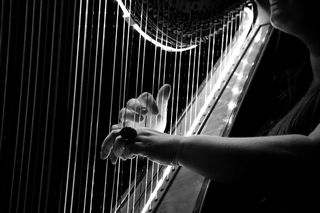
Music has become such an integral part of our lives that it is hard to imagine living without it. It is not known how long music has been a part of human existence, but there have been discoveries of ancient musical instruments carved out of bone dating back between 43,000-60,000 years ago. [1] However, it is likely that our voices and hands were the first musical instruments. We have long known that music has the power to enhance our lives and promote physical, emotional and spiritual healing. Music is an important part of our celebrations and transitions in life. Our final transition from this life is also a time when the power of music can be important to provide peace and comfort, not only to the dying but to family members as well. Research into the use of music in hospice and palliative care has consistently found that patients, family, and staff all benefit from the music, and often after only one session. Music has been found to help decrease anxiety, agitation, and pain. It also helps patients to slow and deepen their breath. [2] [3] [4]
Today, there has been a growing movement to include alternative therapies in hospice and palliative care. As a result, the use of music in these settings has become more accepted and utilized. In 1973, Therese Schroeder-Sheker coined the term Music Thanatology to refer to a specific way of playing music for the dying. It is referred to as “prescriptive music ” The musician is trained to use the harp and voice to improvise and adapt the music to coincide with the changing physiology of the dying patient. [5]
I spoke with nationally renowned harpist Rachel Van Voohries who is frequently asked to play for the dying. She states that the first time she was asked to play the harp at someone's death was for a premature baby. Since then, she has played for people across the lifespan. Ms. Van Voorhies states, “people seek out the harp because of its ability to soothe and comfort.” She also said that when she plays, she too follows the patient’s lead and adjusts the music to changing body language. I asked Ms. Van Voorhies what impact this work has on her. “I am deeply honored to be asked to share in such a private moment with the family,” she said. “The music is touching to me as well.”
Music therapists are another discipline that can provide music for the dying. These musicians are trained in the use of music to relieve physical and psychological pain. One of the major differences between a music thanatologist and a music therapist is the level of patient participation. With prescriptive music, the patient remains a passive recipient. With a music therapist, the patient, if able, can take an active role with the music. They can sing along or play an instrument. The patients can help assemble a playlist of songs they may want to hear as they come closer to death. Playing old, familiar songs can help to remind them of happier times and allows them to reflect on their lives and tell their life story.
A newer addition to music at the deathbed is the Threshold Choir. This organization was formed 19 years ago by Kate Munger, a singer and musician. There are now over 200 chapters around the world. When we think of a choir we might think of a large number of people, but these choirs consist of only three or four people at a bedside. Choir members can choose from 400 different threshold songs. The songs’ lyrics are short and repetitive, focusing on words of love, caring, release and going home. [6] I talked to Margaret Albert the leader of the New Orleans Chapter of the Threshold Choir. She spoke of the many benefits for the patient and family, and their appreciation for the choir’s visits. When asked how singing for the dying affects them, she said, “the members feel privileged to be doing this kind of work. Singing for the dying has enriched our lives beyond what anyone could imagine. We feel that we receive more than we give. It is such a holy time.”
It appears that music at the death bed has positive effects on all who hear it and perform. If you are unable to find a musician to play for your loved one, you can simply play the music that you know the dying enjoys. Music playlists for the dying can also be found online. When words are not enough, there is always music. We all benefit from having music in our lives; it only follows that music can benefit us as we die.
References
2) Galagher, L.M., Lagman, R. and Rybicki, L. (2018). Outcomes of Music Therapy Interventions on Symptom Management in Palliative Medicine Patients. American Journal of Hospice and Palliative Care. February:35(2) 250-257. doi.10./1177/1049909117696723.
3) Krout, R.E. (2001). The Effects of Single-Session Music Therapy. American Journal of Hospice and Palliative Care. Nov-Dec;18(6): 383-390. doi.10.1177/104990910101800607.
4) Freeman,L., Caserta, M., Lund, D., Rossa, S., Dowdy, A.,and Partenheimer, A. (2006) Music Thanatology: Prescriptive Harp Music as Palliative Care for the Dying. American Journal of Hospice and Palliative Medicine. https://doi.org?10.1177/104990910602300206


